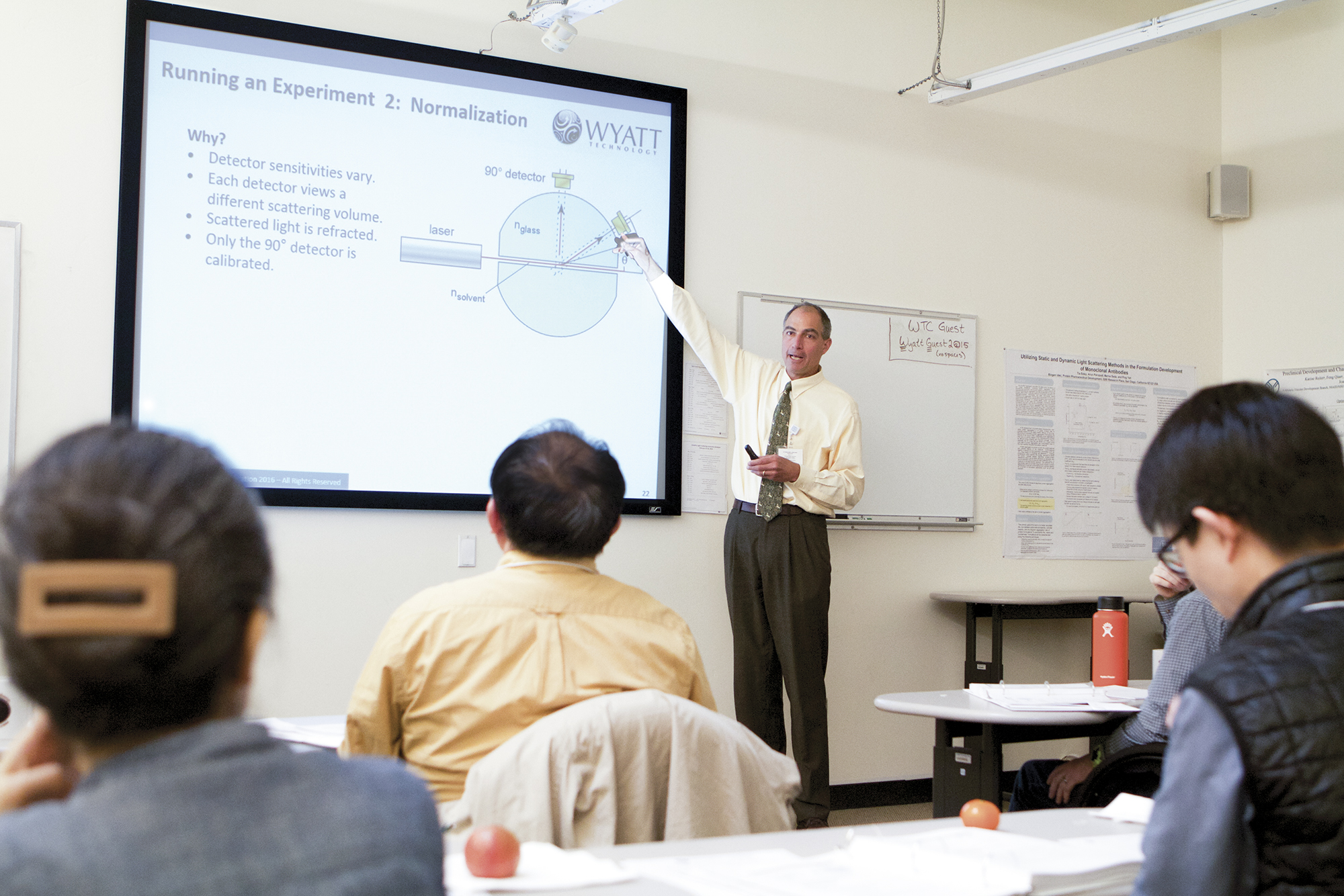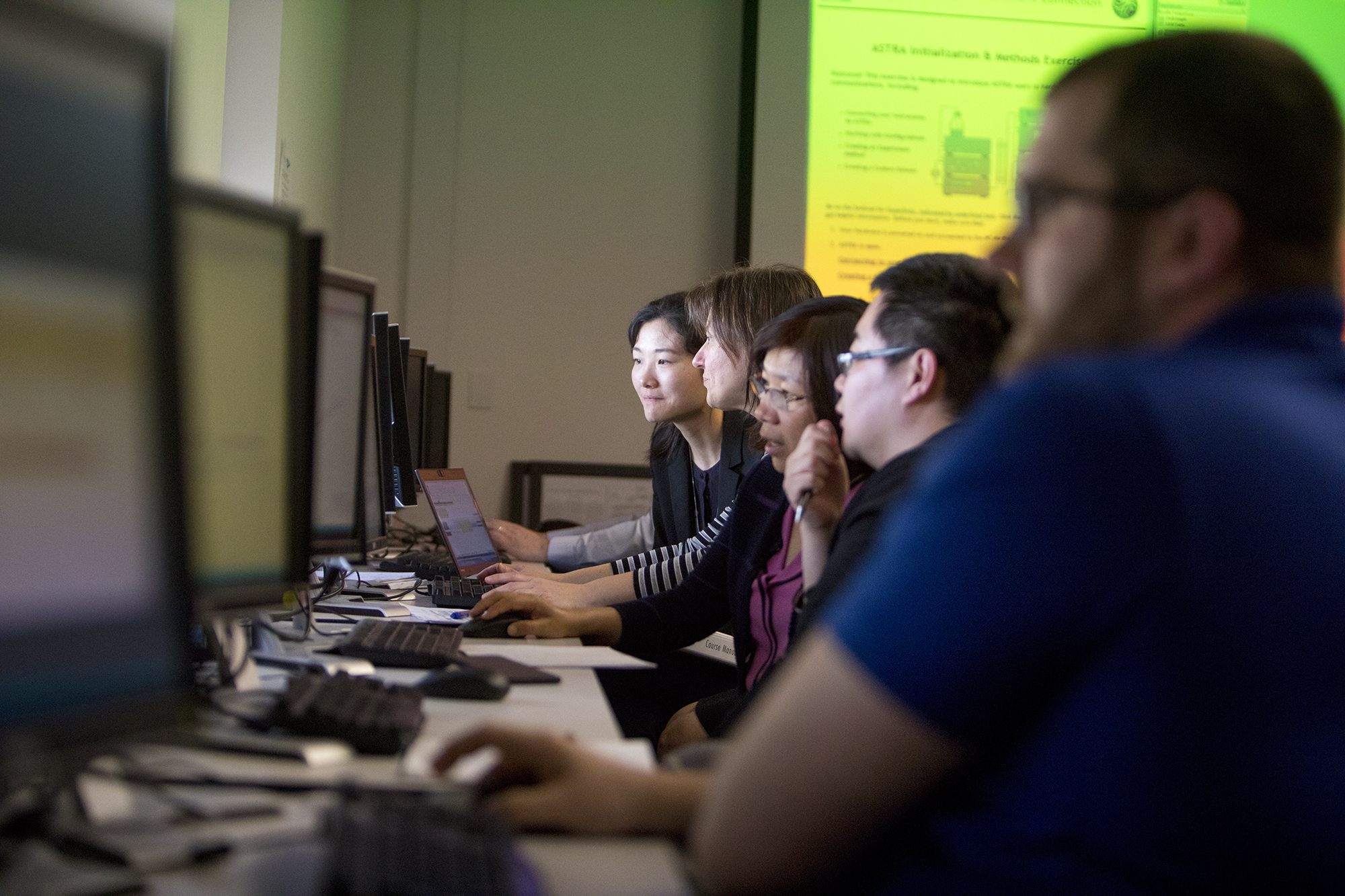Light Scattering University
The LSU Experience
Light Scattering University is the brainchild of Dr. Philip Wyatt, who wanted to instill more than just a passing reference to light scattering. The course demystifies light scattering and provides a unique opportunity to dive into your needs and applications with our expert instructors, connect with light scattering users from a variety of fields, and gain a deeper understanding of your instrumentation and software. Over the past 30 years, the class has grown in its curriculum and its scope. It delves into the theory—and practice—of classical and dynamic light scattering through hands-on practice sessions, software exploration in the computer labs, lectures, and individual instruction. Attendees leave with the most up-to-date documentation, software and firmware versions, and tutorials that benefit everyone back home.
LSU not only reinforces concepts from the first installation training visit but also ensures the same level of knowledge and understanding is passed on to the newest users. The gold standard of education from our experienced LSU faculty gives everyone in the lab the right starting point and sets them up with the best foundation possible. In addition, LSU students discover advanced data processing methods and alternative analytical tools that they may not have been aware of and learn how their MALS and DLS data complements information from other techniques they are using in the lab.
During LSU, there is ample time for our students to meet the people who service and support our instruments—including our application scientists and other technical support specialists. Needless to say, by the time LSU ends, we hope you will have had all your questions answered!

In addition to learning from the faculty, the students in each small cohort learn even more from each other. It’s the perfect opportunity to network, share questions or successes, and troubleshoot common problems. We’ve even introduced colleagues to each other who worked on different floors in the same company but had never met! LSU brings together users with a variety of applications, all of whom share a need for the robust macromolecular characterization afforded by light scattering.
Besides an unrivaled educational opportunity, LSU is a unique time for building rapport between Waters | Wyatt Technology and its customers. Not only do we have staff who have been working with Light Scattering for decades, but we have customers who have used our equipment that long. Friendships transcend jobs and equipment, and help make the LSU experience personal and meaningful, because we don’t just build instruments, we build relationships. We look forward to welcoming you to LSU soon!

Outstanding!
Often described by participants as the best instrument user training they have ever attended, Light Scattering University (LSU) is an intensive training experience that combines hard work, good food and a friendly, relaxed atmosphere. Standard LSU operates on two main campuses: at Wyatt Technology Headquarters in Santa Barbara, CA, USA, where attendees enjoy the famously comfortable and sunny Santa Barbara climate, and at Wyatt Technology Europe in Dernbach, Germany, with easy access from much of Europe. Additionally, we also offer a smaller-scale, Regional LSU training option. Regional LSU is a similar training experience to the Standard LSU from our main campuses; however, it is only for owners of DynaPro™ NanoStar™, DynaPro™ Plate Reader™, DAWN™, miniDAWN™, and Optilab™ instruments.
In Santa Barbara, LSU and DynaLSU are offered throughout the year. In addition, LSU attendees may elect to add a fourth day for extra training on their Eclipse™ or Calypso™ instruments, according to our quarterly schedule, and ZetaStar™ training is offered as part of DynaLSU routinely.
In Dernbach, LSU is offered throughout the year, and DynaLSU is offered roughly every other month. LSU attendees in Dernbach may elect advanced training on the ViscoStar™ or Eclipse instruments according to the yearly schedule, including theory, installation, operation, and method development. Half the classes are offered in German.
Regional LSU and Regional DynaLSU training is offered several times each year in North America and covers the same curriculum as the Santa Barbara and Germany counterparts while being slightly condensed.
For more details, please explore the LSU training dates in Santa Barbara, regionally in North America, and in Germany.
Please note that within North America, LSU training credits are fully transferable and may be used for attending either Standard LSU in Santa Barbara or Regional LSU. Travel/lodging is not included for Regional LSU training.
Why attend?
LSU and DynaLSU are designed to get you up and running with your Wyatt instruments as quickly as possible. The syllabus includes light scattering theory and lots of hands-on work with light scattering instruments and ASTRA or DYNAMICS software. You'll also get an introduction to some of the advanced techniques, such as field-flow fractionation and composition-gradient light scattering. Pass the exams and you'll receive a Master of Light Scattering certificate, sure to impress your boss and coworkers!
Many trainees come away from LSU inspired with new ideas for how light scattering can solve some of their analytical challenges. One of the favorite aspects of LSU mentioned by attendees is the opportunity to meet and work with the scientists and support staff that they usually only speak with over the phone or email.
DynaLSU is a comparable course for users of DynaPro instruments and is offered at all our campuses. Many Santa Barbara LSU attendees elect to add a fourth day for extra training on their Eclipse, ViscoStar or Calypso instruments. Dernbach attendees may elect advanced training on field flow fractionation, including theory, installation, operation, and method development.
For more details, please explore the Light Scattering University training options.
It's personal.
The lessons are a combination of lectures, seminars, hands-on lab work, quizzes, and individual instruction based upon the background and applications of each student. With a low ratio of students per instructor, there is ample time for individual help and small group work.
Students are encouraged to bring their light scattering data files for individual consultations.
Schmooze!
Social time is also scheduled to allow the students to learn from each other and to interact with Wyatt staff in a relaxed atmosphere. We encourage all attendees to join the Light Scattering University Alumni group on LinkedIn, and keep in touch!
The basics
- The basics and applications of light scattering with practical demo
- Instrument setup, maintenance, and flow cell cleaning
- Coupling size exclusion chromatography (SEC) with multi-angle light scattering (MALS) to determine the absolute molar mass and size distributions of macromolecules
- How to get the most out of your light scattering data: the ins and outs of ASTRA Software
- Calibration and use of UV and dRI detectors to determine sample concentration
Small group lab practicals
- Analysis of unfractionated samples and generating a Zimm Plots to determine the molar mass, radius, and the second virial coefficient
- Determination of the refractive index increment dn/dc values through on-line and off-line dRI techniques
- Assessing and optimizing the quality of your light scattering data
Beyond the basics
- Measuring size (hydrodynamic radius) with online or batch dynamic light scattering (DLS) methods (WyattQELS and DynaPro)
- How to determine polymer conformation, branching, and intrinsic viscosity with SEC-MALS
- Application-specific seminars:
- analysis of conjugated proteins and copolymers
- field-flow fractionation (FFF)
- batch methods
- analysis of protein-protein interactions with composition-gradient MALS (CG-MALS)
- analysis of light-absorbing and fluorescing samples
- and more!
DynaLSU and ZetaStar LSU: the basics
- The basics and applications of dynamic light scattering (DLS) with practical demo
- Instrument setup, maintenance, cuvette/sample cell cleaning, and sample preparation tips
- How to determine the diffusion coefficient, hydrodynamic radius, and polydispersity of an unfractionated, dissolved sample
- Assessing and optimizing the quality of dynamic light scattering data and data interpretation
- How to get the most out of your light scattering data: Using DYNAMICS software to characterize your proteins, polymers and nanoparticles
Small group lab practicals
- Hands-on DLS analysis of unfractionated samples in microwell plates (Plate Reader), batch cuvettes (NanoStar and ZetaStar), or flow cell (ZetaStar) and automation of measurements
- Hands-on SLS analysis of unfractionated samples for molar mass determination (Plate Reader and NanoStar)
- Hand-on FIDELIS analysis (ZetaStar), automated sample delivery and batch analysis
- Assessing and optimizing the quality of your light scattering data
Beyond the basics
- Advanced analysis techniques:
- temperature transitions (unfolding and aggregation)
- intermolecular interactions via A2 (SLS) and kD (DLS)
Additional topics covered in ZetaStar LSU
- The basics and applications of electrophoretic mobility measurements
- Hands-on FIDELIS analysis, automated sample delivery and batch analysis
- How to determine the electrophoretic mobility, zeta potential, net charge, and isoelectric point
- Assessing and optimizing the quality of mobility data and data interpretation
Who should attend
The lessons learned in LSU and DynaLSU will be of tremendous benefit to those individuals who:
- Purchased a new DAWN, miniDAWN, microDAWN or DynaPro light scattering instrument
- Added Eclipse field-flow fractionation or Calypso concentration-gradient system to a MALS setup
- Changed job responsibilities, and will be using a Wyatt instrument for the first time
- Have been using a Wyatt MALS, DLS, or ELS instrument and want to increase their knowledge of light scattering, data analyses, and applications
- Are responsible for finding new applications for light scattering within their research group


